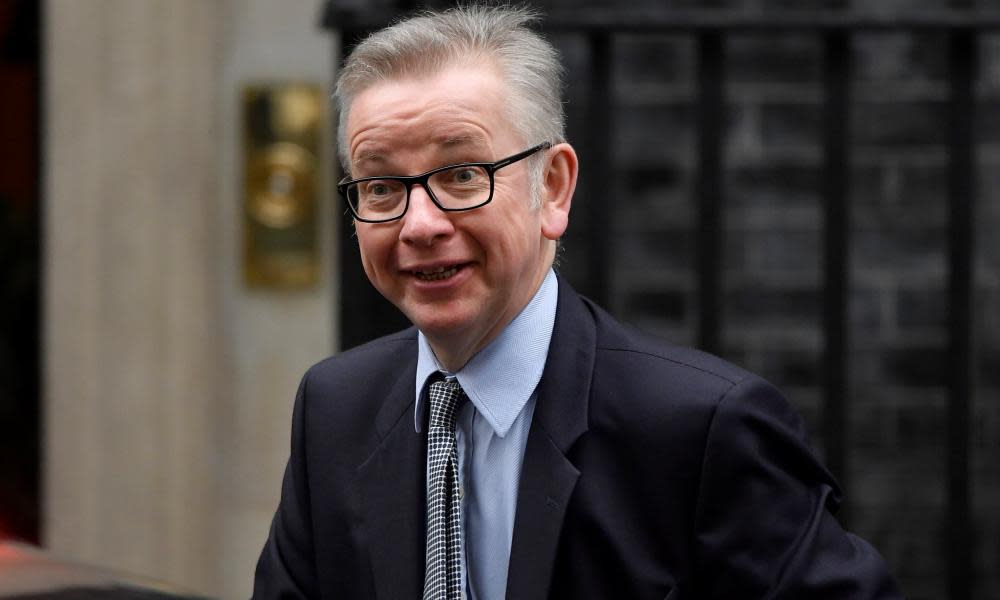Commons Brexit deal vote will definitely go ahead, says Gove

Michael Gove has insisted Tuesday’s crunch Commons vote on Theresa May’s Brexit deal will take place as the prime minister made a final push for MPs’ support in a test of authority she is almost universally expected to lose heavily.
Gove, the environment secretary and a key Brexit voice in the cabinet, told colleagues that while May could seek new concessions from Brussels, there was a risk of her – or another leader – returning with a worse deal.
But in a sign of the febrile atmosphere ahead of the vote, Gove became the latest senior Conservative to decline to rule himself out of seeking to succeed May if she is ousted, saying only that it was “extremely unlikely” he would do so.
With just over 24 hours to go before May faces the reckoning of her MPs, few of the 100-plus rebels who have vowed to vote against her deal showed any sign of altering their positions.
The prime minister is under pressure from aides and senior ministers to considering pulling the vote on Tuesday, a move Downing Street has emphatically denied will happen, though a final decision is unlikely to be made until the 11th hour.
But asked on BBC Radio 4’s Today programme if the vote was “definitely, 100%” going to happen, Gove replied: “Yes”. Pressed on the point, he said: “The vote is going ahead.”
Gove, who will close the five-day debate on the deal for the government on Tuesday, also dismissed speculation that if prevented by Commons procedures from calling off the vote at the last moment, the government could instead instruct him to talk so long that there was no time for it to happen.
“No, I’ve been working on my speech over the weekend, and I’m certainly not going to filibuster,” he said.
May has made last-minute calls to Donald Tusk, the European council president, and to the taoiseach, Leo Varadkar.
No 10 sources have played down the prospect of May making a dash to Brussels to ask for further concessions before the scheduled EU summit at the end of the week, suggesting that there would be little political benefit.
Gove said May would undoubtedly seek extra concessions from the EU, amid widespread dismay among Tory backbenchers about the deal. But, he warned, there was little leeway for her on the most contentious issue, that of the planned backstop insurance policy to rule out the possibility of a hard Irish border.
The backstop was a “very uncomfortable position” for EU leaders, and if forced to renegotiate it, they might make the UK’s terms worse, Gove argued.
“Of course, we can improve this deal, and the prime minister is seeking to improve this deal,” he said. “One worry that I have is, some people of course want us to re-open the withdrawal agreement. One of the worries I have is that if we do attempt a fundamental renegotiation of the negotiation agreement, the European Union countries who recognise just how uncomfortable the backstop is for them may change the withdrawal agreement in a way that may not necessarily be to our advantage.”
The backstop, he argued, gave the UK “full access to European markets, with no tariffs and no quotas, and at the same time we pay no money. And at the same time we have total control over who comes here”.
This meant that the EU “have done what they said they would never do in these negotiations – they have split the four freedoms, they have allowed us to cherrypick”.
In Brussels, Ireland’s deputy prime minister insisted that there could be no change to the backstop.
Arriving in Brussels for the EU foreign ministers’ meeting, Simon Coveney said: “The deal... is not going to change. Particularly the legal language of the withdrawal treaty.
“I hope people will see it for what it is, which is a fair, balanced document.”
Ambitious Brexiter MPs have already begun positioning themselves in anticipation of a heavy defeat for May.
On Sunday, the Brexit-supporting former cabinet ministers Esther McVey and Dominic Raab hinted at their leadership intentions on the airwaves and the former foreign secretary Boris Johnson also refused to rule out a run.
Asked if he would rule himself out, Gove said: “I think it’s extremely unlikely that I will ever be in that position.” He added: “You never know, if Boris Johnson nominated me for the leadership and Philip Hammond seconded, I might think again, but it’s extremely unlikely that they scenario would ever happen.”
Complicating matters still further for the prime minister, the European court of justice ruled on Monday that the UK can unilaterally stop the Brexit process, in a decision that will boost demands for a second EU referendum.
Gove said calls for a so-called people’s vote were disingenuous, as it seemed to be “an attempt by people who never accepted that first vote, who didn’t accept that democratic mandate, who want to overturn it”.
The message from such people to those who voted leave was, he argued, “We think that you were frankly too dim to appreciate the nature of the decision you were making.”

 Yahoo News
Yahoo News 
